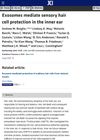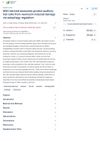MSC-Derived Exosomes Protect Auditory Hair Cells From Neomycin-Induced Damage Via Autophagy Regulation
January 2024
in “
Biological Research
”

TLDR Tiny particles from stem cells can help protect ear cells from antibiotic damage by helping cells remove damaged parts.
The study found that exosomes derived from mesenchymal stem cells (MSCs) can protect auditory hair cells from damage caused by neomycin, an antibiotic known to cause hearing loss. This protection is achieved through the regulation of autophagy, a process that removes unnecessary or dysfunctional components within a cell. The researchers found that exosomes increased the activation of autophagy in hair cells, both in a normal state and after neomycin-induced damage. The study also found that exosomes activated endocytosis, a process by which cells internalize molecules, and this activation was necessary for the exosome-mediated increase in autophagy. The researchers concluded that exosomes could potentially be used as a therapeutic agent for sensorineural hearing loss (SNHL), with autophagy activated by exosomes being a potential therapeutic strategy. However, the study also noted limitations, including the use of only one dose and one route of administration, and the complexity of exosome contents.





